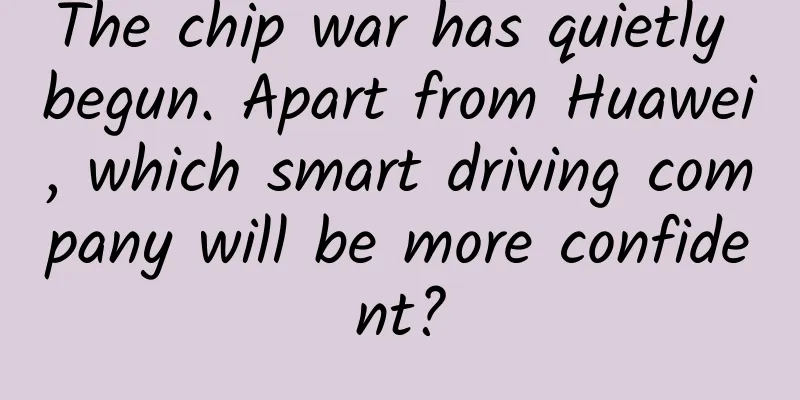The chip war has quietly begun. Apart from Huawei, which smart driving company will be more confident?

|
The competition of new energy vehicles has entered the second half, which is the competition in the field of intelligence that we often mention. Intelligence mainly refers to smart cockpit and intelligent driving experience, both of which are inseparable from the support of chips. At present, the Orinx chips and Qualcomm 8155 and 8295 chips used in the cars promoted by some domestic automobile brands are all from the United States. At the same time, the car computer systems are basically based on Android and Linux, and use American software. From this perspective, if the United States really bans automotive chips and software, it will undoubtedly deal a heavy blow to automakers that do not have their own technology and use American technology. Therefore, whether Chinese automakers can leave American chips depends mainly on whether they have the ability to be self-reliant. If the chip dispute continues, for Chinese automakers, whether they have the ability to develop their own products will become the main direction of future competition, and may even determine whether they can continue to provide consumers with high-quality intelligent driving functions. So, in the context of the chip dispute provoked by the United States, if the mainstream new energy vehicle companies do not rely on chip imports, whose intelligent driving will be more "confident"? There are many new forces at present, and we take the more representative "Wei, Xiao, and Li Auto" as an example. Let’s first look at NIO. NIO’s intelligent driving chip is the self-developed Shenji NX9031, which is manufactured by TSMC; the onboard chip is from Qualcomm of the United States, and the intelligent driving algorithm is self-developed; the car system is developed based on the Android system. In general, NIO does not rely on American chips for intelligent driving, so its intelligent driving level will not be affected. Although the onboard chip is from Qualcomm, if it really needs to be replaced, there are already good options in China. If it cooperates with mainstream technology companies across industries, it is not impossible to replace Qualcomm. The situation of Xpeng Motors is not so optimistic. Xpeng's intelligent driving chip is from NVIDIA, its car chip is from Qualcomm, its intelligent driving algorithm is self-developed, and its car system is developed based on Android. Among them, the key intelligent driving chip is not self-developed. Once the chip is "stuck", Xpeng is likely to lose its competitiveness in intelligent driving. The same is true for Ideal. Its intelligent driving chip is from NVIDIA, its in-vehicle chip is from Qualcomm, its algorithm is self-developed, and its car system is developed based on the Android system. In other words, Ideal Auto's current intelligent driving and car system chips are all imported, and its intelligent driving level will be greatly affected by the US chip sanctions. Another new energy player in the automotive industry, Zeekr, is also highly dependent on imported chips. Its intelligent driving chips are from Nvidia, and its in-vehicle chips and algorithms are from Israel's Mobile Eye. It is said that this company has a market share of up to 27.7% in my country's intelligent driving field and is an "invisible giant" in the field of domestic intelligent driving. Unfortunately, the United States has also imposed new export restrictions on semiconductor equipment manufacturing companies in Israel and other countries, which means that car companies that rely on this company's chips have little autonomy in intelligent driving. Although the above-mentioned domestic brands are more or less dependent on imported chips in terms of intelligent driving, we also have players who completely take the route of self-development. Huawei Smart Car, which has risen in recent years, uses the self-developed Chinese Huawei Ascend intelligent driving chip, equipped with the Chinese Huawei Kirin car machine chip, and has Huawei's self-developed algorithm and Huawei Harmony OS system. This means that everything is made in-house, and Huawei can always maintain stable performance in intelligent driving regardless of chip sanctions. It can be seen that at present, even most of our mainstream car companies still do not have the ability to develop their own chips. If we really decouple from the United States on chips, the intelligent driving of many car companies will be greatly affected. So, does this mean that we have no ability to compete with American chips in the chip war? Actually, not necessarily. At present, in the field of chip design software, Huawei has successfully developed purely domestic EDA tools, breaking the US technology monopoly. In terms of chip materials, from silicon wafers to photoresists and electronic gases, Chinese companies have also achieved breakthroughs in key technologies and domestic substitution. Especially in 2024, many car companies, including some chip research companies, have also come up with results that can be mass-produced. We can take a look at a few examples. For example, NIO announced at the end of July 2024 that its first automotive-grade 5nm smart driving chip "Shenji NX9031" was successfully taped out, and plans to install it on the NIO ET9 to be launched in the first quarter of 2025. Xpeng Motors also announced the successful tape-out of its Turing chip, which can be used for L4 autonomous driving and supports large models with 30 billion parameters running on the terminal side. In addition, related technology companies have also reported a lot of good news. CoreEngine Technology has launched the 7nm high-end autonomous driving chip "Xingchen No. 1" (AD1000), which can meet the needs of L2 to L4 intelligent driving. It is planned to achieve mass production in 2025 and large-scale vehicle application in 2026. Momenta's Xinxin Hangtu has launched a mainstream chip with medium computing power, which has now entered the tape-out stage; Huixi Intelligent released the first domestically produced 7nm automotive-grade high-computing power chip "Guangzhi R1" that is natively adapted to the Transformer large model. The chip is designed for end-to-end autonomous driving. From this perspective, the chip war launched by the United States against China may temporarily affect the competitiveness of some companies in intelligent driving, but Chinese automakers still have ways to respond actively. Automakers with self-development capabilities should try to be independent and create unique competitive advantages. Those who do not have self-development capabilities can also establish cooperation with domestic chip companies to avoid falling behind in the era of intelligent electricity. In general, the focus of competition in the era of intelligent electricity is still intelligent driving. As for who is more confident, it depends on who can grow rapidly in the chip war. |
>>: Looks light, sees more clearly, in-depth experience of Pico G2 VR all-in-one
Recommend
Ezhou SEO training: page template updates, 404 page usage and redirection issues are all Xiong Zhanghao page transformation comparison
When configuring the Xiong Zhang account, you fir...
User retention: Talk about the psychological routines that make users unable to stop
The strategic essence of an effective business mo...
Hey! You "sons of the earth" in armor and helmets, you have good news again
The Chinese pangolin (Manis pentadactyla) is dist...
Android phone fluency ranking: Xiaomi fifth, OnePlus first, where is Huawei?
As we all know, mobile phones are divided into tw...
How much does it cost to produce the Deyang Chemical Mini Program? Deyang Chemical Industry Mini Program Production Price Inquiry
WeChat Mini Program is an application that users ...
Tips | How to save the click-through rate of pure image ads?
In this era of information explosion, how can we ...
The most "stinky" review in history, after testing all these snail noodles, we advise you not to eat this ingredient packet
How crazy are Chinese people about snail noodles?...
Can the Webb telescope find extraterrestrial life soon? Scientists are confident
Scientists believe that although no extraterrestr...
How much do you know about the information flow advertising routines of highly profitable products?
After reading this article, I hope you can improv...
Antioxidant King! People who often eat these 6 types of food really age slowly
Planning丨Zhong Yanping Visual丨Zhu Hangyue Design丨...
Forbes: Producing iPhones in the U.S. is challenging but not impossible
According to a report by Forbes Online on October...
A review of 15 best-selling marketing campaigns in the first half of 2018
Looking back at the first half of 2018, marketing...
About to be "launched", what happened to the United Launch Alliance?
Recently, according to foreign media reports, the...
How to spend the May Day holiday? Many places advocate taking local holidays during the epidemic. Please keep the travel safety tips →
According to the Notice of the General Office of ...
Toyota enters a long winter
The auto industry is in a state of chill, and Toy...









